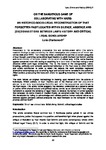On the Dangerous Game of Collaborating with Nazis: An Historico-Socio-Legal Reconstruction of that Forgotten Past Located within Silence, Absence and [Dis]Connections between Law’s History and Critical Legal Scholarship
| dc.contributor.author | Charlesworth, Lorie | |
| dc.date.accessioned | 2017-03-20T15:57:28Z | |
| dc.date.accessioned | 2017-04-11T08:44:35Z | |
| dc.date.available | 2017-03-20T15:57:28Z | |
| dc.date.available | 2017-04-11T08:44:35Z | |
| dc.date.issued | 2013 | |
| dc.identifier.citation |
Charlesworth, L. (2013) 'On the Dangerous Game of Collaborating with Nazis: An Historico-Socio-Legal Reconstruction of that Forgotten Past Located within Silence, Absence and [Dis]Connections between Law’s History and Critical Legal Scholarship', Law, Crime and History, 3(2), pp.52-81. Available at: https://pearl.plymouth.ac.uk/handle/10026.1/8881 | en_US |
| dc.identifier.issn | 2045-9238 | |
| dc.identifier.uri | http://hdl.handle.net/10026.1/8881 | |
| dc.description.abstract |
Responses to the deliberately provocative title are contextualised within this writer’s research findings to date concerning the Allied investigation and prosecution of ‘minor’ war crimes trials after WWII. From these the writer considered the survival of certain categories of Nazi thought, permitting some critical legal theorists to admit the Nazi Carl Schmitt and his anti-liberal concept of ‘concrete orders’ into its canon of critical texts. In this, some theorists appear concerned more with testing or searching for a ‘pure idea’ of law than noting a moral absence within such legal scholarship. That is, the nature of the transgressive, taboobreaking, politically and culturally sanctioned behaviour of the Nazi state to which Schmit and others contributed. In order to widen this debate this work considers neglected alternative contemporary and co-existing legal and cultural norms revealed in the actions of Allied soldiers prosecuting Germans and others for appalling breaches of legal and human rights. The work follows an original methodology in drawing upon research into the actions of individuals, British soldiers, of Nazi theorists and of the German post war population’s silence. Its aim is to recontextualise Schmitt’s work within his very political commitment to the Nazi cause. This article further suggests that decency, understood as a personal sense of justice within shared cultural and political values, serves as an alternative if less elegant framework to counter the tendency of legal theory to devalue the human. A further question thus emerges: do some strands of modern theory, as occurred under Nazi rule, collude in this devaluation by failing to acknowledge and validate positive human cultural values as a defence against perverse political pressures that lead inevitably to the corruption of legal process and law itself? | en_US |
| dc.language.iso | en | en_US |
| dc.publisher | University of Plymouth | |
| dc.rights | Attribution 4.0 International (CC BY 4.0) | * |
| dc.rights.uri | https://creativecommons.org/licenses/by/4.0/ | * |
| dc.subject | ‘Minor’ war crimes trials | en_US |
| dc.subject | British Army | en_US |
| dc.subject | Schmitt | en_US |
| dc.subject | critical legal studies | en_US |
| dc.title | On the Dangerous Game of Collaborating with Nazis: An Historico-Socio-Legal Reconstruction of that Forgotten Past Located within Silence, Absence and [Dis]Connections between Law’s History and Critical Legal Scholarship | en_US |
| dc.type | Article | en_US |
| dc.type | Article | |
| plymouth.issue | 2 | |
| plymouth.volume | 3 | |
| plymouth.journal | SOLON Law, Crime and History |



